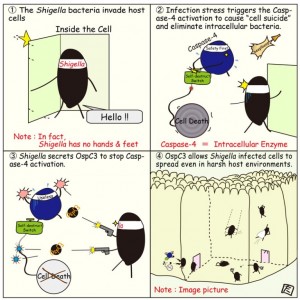Shigella stops novel “cell suicide system” to promote infection and proliferation Novel Shigella Caspase inhibitor and new type of cell death

Dr. Chihiro Sasakawa (Emeritus Professor), Taira Kobayashi (Institute of Medical Science), and their teams discovered a novel cellular defense mechanism against bacterial infections. By understanding this mechanism, it may help stop serious infectious diseases caused by pathogenic bacteria such as Shigella, Salmonella, and pathogenic-E. coli.

© Taira Kobayashi. A cartoon for understanding the intracellular relation between the Shigella infection and the Caspase-4-dependent defense mechanism.
Individual cells have various functions that are important for the survival of the organism. For example, when cells are threatened by cancer or infection, they will normally destroy themselves. They cause “cell suicide” to prevent further proliferation of the cancer or infection and allow the organism to survive. This “suicide system” is well-managed by an intracellular enzyme family called Caspase. However, not all aspects of Caspase function are known.
This research shows the Shigella bacteria inhibit Caspase-4 (a member of the Caspase family) with an inhibitor called OspC3, which prevents cell suicide. Specifically, OspC3 binds to Caspase-4 and stops its activation by closing the lid on the putative catalytic pocket. Interestingly, the OspC3’s function does not work for the other Caspase family enzymes; therefore, OspC3 selectively inhibits Caspase-4-dependent cell death. Research was also carried out with a mutant form of Shigella that lacked OspC3. In this case, a previously unreported form of cell suicide occurred and Shigella was eliminated from cells and animals. A Shigella OspC3-deficient mutant caused Caspase 4-dependent inflammatory epithelial cell death (pyroptosis). The research shows the danger of OspC3, which allows Shigella infected cells to spread even in harsh host environments.
These results have brought light to a novel defense mechanism against intestinal infectious bacteria. This discovery will further understanding of the role of Caspace-4 in a host’s defense mechanism as well as bacterial infection and proliferation. Moreover, the discovery of OspC3 and the Shigella OspC3-deficient mutant is expected to help in the development of a drug for Caspace-4 related diseases such as sepsis.
Press release (Japanese)
Paper
Taira Kobayashi, Michinaga Ogawa, Takahito Sanada, Hitomi Mimuro, Minsoo Kim, Hiroshi Ashida, Reiko Akakura, Mitsutaka Yoshida, Magdalena Kawalec, Jean-Marc Reichhart, Tsunehiro Mizushima, Chihiro Sasakawa,
“The Shigella OspC3 Effector Inhibits Caspase-4, Antagonizes Inflammatory Cell Death, and Promotes Epithelial Infection”,
Cell Host & Microbe 2013/5/16 (JST), doi: 10.1016/j.chom.2013.04.012.
Article link







